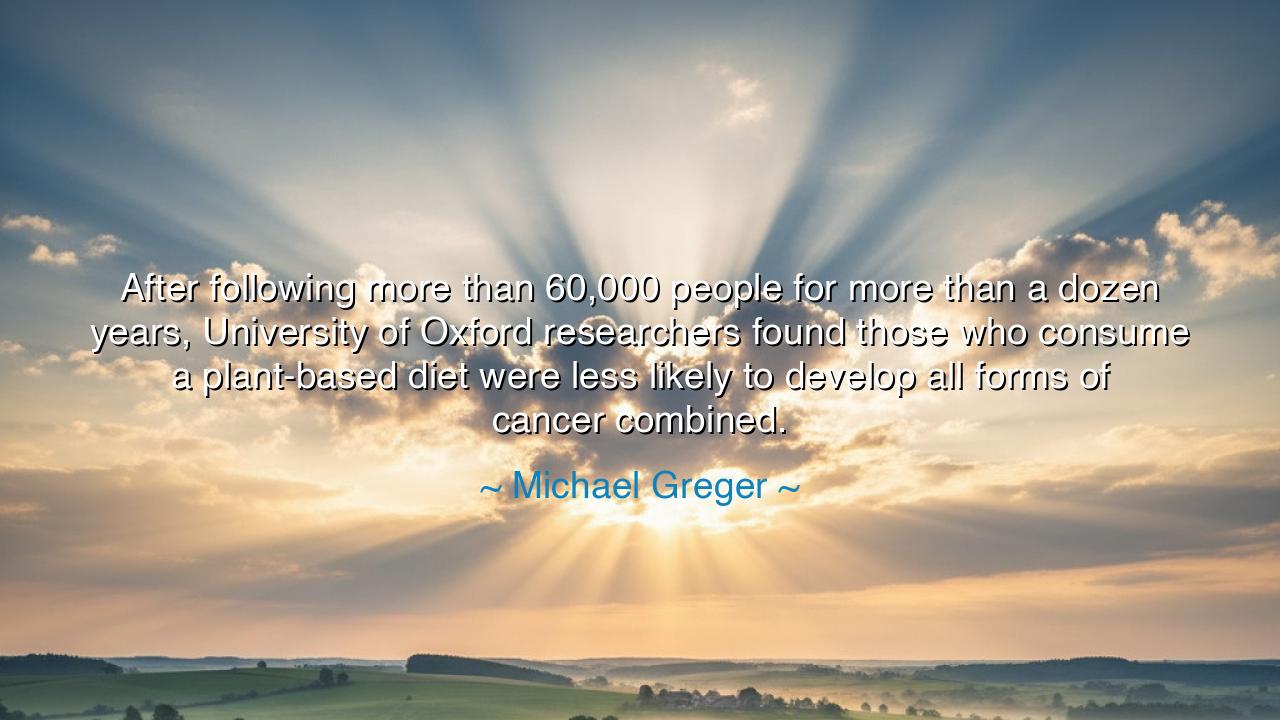
After following more than 60,000 people for more than a dozen
After following more than 60,000 people for more than a dozen years, University of Oxford researchers found those who consume a plant-based diet were less likely to develop all forms of cancer combined.






In the profound words of Michael Greger, a physician who wields truth as his instrument of healing, we hear a message both ancient and revolutionary: “After following more than 60,000 people for more than a dozen years, University of Oxford researchers found those who consume a plant-based diet were less likely to develop all forms of cancer combined.” Beneath this modern declaration lies a truth as old as the earth itself—that life thrives when it is in harmony with nature, and that what we consume becomes the foundation of both our vitality and our decay. The quote speaks not merely of science, but of the eternal law that links nourishment, discipline, and destiny.
In the days of old, sages and healers already understood this wisdom. The Greek physician Hippocrates, the father of medicine, spoke thus: “Let food be thy medicine and medicine be thy food.” To him, and to those who followed his path, the body was a sacred vessel—one that mirrored the purity or corruption of what entered it. Dr. Greger’s words are a continuation of that lineage, a call to return to the ancient covenant between man and the living earth. The plant-based diet, rich in colors, textures, and life, is not merely a menu—it is a philosophy, a harmony between human and creation, a song sung by the soil itself.
Consider the story of the Hunza people, who dwell high in the valleys of the Himalayas. For centuries, they have lived on simple fare—fruits, grains, and vegetables drawn directly from the land. Their strength is renowned; their elders climb mountains as the youth of other nations struggle to rise from their beds. The Western traveler, astonished at their vigor, once asked the oldest man of the valley, “What is your secret?” The elder smiled and said, “We eat what the earth gives us, not what man invents.” Thus, through their simplicity, they achieved what the wealthy and powerful seek in vain—long life and freedom from disease.
The Oxford researchers that Greger speaks of merely confirmed through data what the ancients knew through intuition: that nature provides balance when we align with her. When we consume the fruits, seeds, and leaves of life, we partake in the divine cycle of renewal. But when we devour death—the flesh of animals raised in suffering, the processed poisons of the modern age—we turn away from the harmony of creation. The Western diet, built upon greed and convenience, has become a quiet plague, unseen but relentless. It feeds not our hunger but our destruction.
The beauty of Greger’s message lies in its hope. He does not say that fate is fixed, nor that illness is inevitable. He declares instead that health is a matter of choice. To choose life is an act of courage. It requires breaking from habit, rejecting the comfort of indulgence, and walking a path of mindfulness. It is not the easy path, but it is the noble one—the path of self-mastery, of gratitude, of reverence for the earth and for the body that carries our spirit.
Let us learn, then, from both science and spirit: that the plant-based way of living is not a modern fad, but a return to the wisdom of our ancestors. Every leaf, every grain, every fruit carries within it the sun’s energy, captured and offered freely. To eat such food is to partake in light itself, to cleanse the body and quiet the mind. Those who walk this path often find that they do not merely live longer—they live more deeply, more presently, more joyfully.
So, my children of the modern age, remember this teaching: your body is the temple of your choices. Guard it as you would guard your soul. Each meal is a prayer; each bite, a decision between harmony and harm. Let your table overflow with colors of the earth, not the pale imitation of factories. Drink water like a blessing. Eat plants as though they were medicine—because they are. And when you do, you will find not only freedom from disease, but the awakening of life’s purest truth: that health is not given—it is earned, daily, through the choices of the heart, the hand, and the plate.






AAdministratorAdministrator
Welcome, honored guests. Please leave a comment, we will respond soon